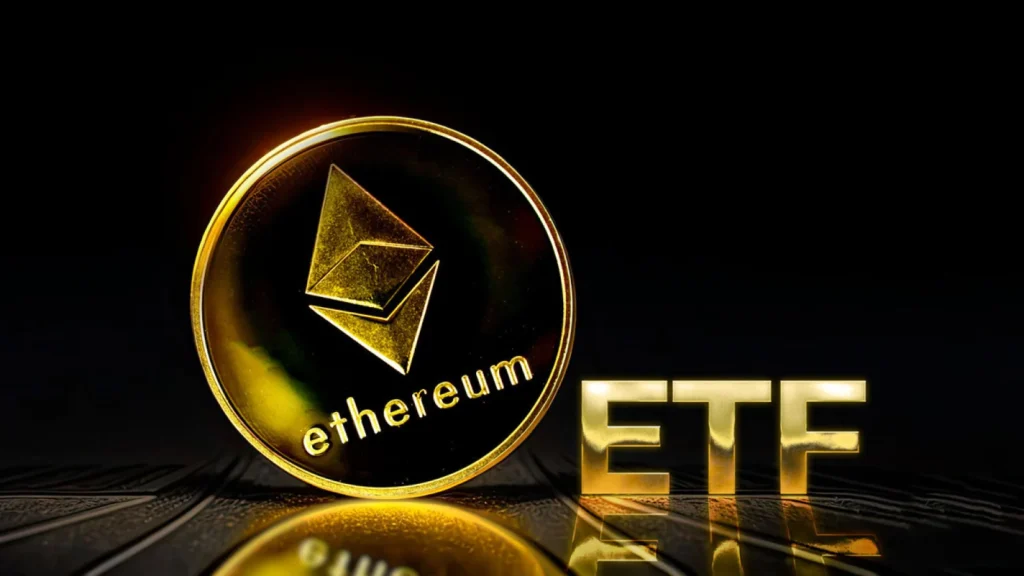Blogpost Contents
ToggleThe United States Securities and Exchange Commission (SEC) recently approved several Ethereum exchange-traded funds (ETFs) following the earlier approval of Bitcoin ETFs in January 2024. This decision marks a significant milestone for the crypto industry, providing investors with a regulated avenue to participate in the Ethereum market. The unexpected dynamic toward approval suggests a softening stance on crypto regulation in the U.S.
The symbolic value of this approval confirms Ethereum’s status as a non-security, similar to Bitcoin, and emphasises the growing acceptance of digital assets in mainstream finance. As Ether ETFs hit major stock exchanges, they are expected to attract broader interest and potentially stabilise prices, further shaping the trajectory of the crypto market.

What are Ethereum ETFs?
An Ethereum ETF functions as a financial product that closely tracks the price movements of Ethereum. Investors can buy and sell shares of this ETF on traditional stock exchanges. This regulated investment avenue offers a convenient way for investors to participate in the cryptocurrency market without the need to handle digital assets directly. Essentially, the ETF mirrors the performance of Ethereum, providing exposure to its value without the complexities associated with direct ownership.
History of Ethereum ETFs
A Look Back Exchange-traded funds (ETFs) are investment vehicles that allow investors to buy shares representing a diversified portfolio of assets, such as stocks, bonds, or commodities. In traditional finance, ETFs are traded on stock exchanges, providing liquidity and flexibility to investors. They offer exposure to specific sectors, indices, or asset classes without requiring direct ownership of the underlying assets. ETFs are known for their low expense ratios and ease of trading, making them popular among retail and institutional investors.
SEC Reluctance and Concerns
The SEC’s journey with crypto-related ETFs has been marked by caution and deliberation. While Bitcoin ETFs received approval in January 2024, Ethereum (Ether) faced additional scrutiny due to its unique characteristics. Here are some key points:
-
- Ether’s Classification as a Security: Unlike Bitcoin, which the SEC has deemed a non-security, Ether’s status has been less clear. The Howey Test, used to determine whether an asset qualifies as a security, has been a point of contention. Ether’s initial sale during its ICO (Initial Coin Offering) raised questions about its classification. The SEC’s concern was whether Ether should be treated as a security, subject to stricter regulations, or as a commodity like Bitcoin.
-
- Staking and Decentralization: Ethereum’s transition from a proof-of-work (PoW) to a proof-of-stake (PoS) consensus mechanism introduced staking. Staking involves locking up Ether to secure the network and validate transactions. The SEC has been cautious about staking, as it raises questions about centralisation, governance, and potential conflicts of interest. The fear is that large stakes could influence network decisions, impacting the broader market.
-
- Market Manipulation and Investor Protection: The SEC’s primary mandate is investor protection. Concerns about market manipulation, lack of transparency, and potential fraud have led to a conservative approach. The agency aims to strike a balance between innovation and safeguarding investors. The fear of price manipulation through ETFs, especially in a volatile crypto market, has been a significant factor in their deliberations.
Recent Approval and Implications
The recent approval of Ethereum ETFs signifies a shift in the SEC’s stance. It acknowledges Ethereum’s maturation, growing institutional interest, and the need for regulated investment products. As Ether ETFs hit the stock exchanges, they provide a regulated avenue for investors to participate in the crypto market. However, the SEC’s vigilance remains, and ongoing monitoring will be crucial to ensure investor protection and market integrity.
Ethereum ETFs Get the Green Light
| Aspect | Details |
| Number of Approved ETFs | Eight Ethereum exchange-traded funds (ETFs) have received approval from the SEC. |
| Issuers Involved | Ark/21 Shares, Bitwise, BlackRock’s iShares, Fidelity, Franklin Templeton, Grayscale, Invesco/Galaxy, and Hashdex are among the issuers. Valkyrie opted out for business reasons. |
| Approval Process | The SEC approved delegated authority, bypassing the traditional commission vote. |
| Market Impact | Following the news, Ether’s price surged above $3,800, reflecting positive market sentiment. |
| Significance | Ethereum ETFs provide regulated exposure to digital assets, shaping the crypto market’s trajectory. |
Key Players: Who’s Behind these Ethereum ETFs?
VanEck Ethereum Trust:
Issuer: VanEck
Description: VanEck, a well-established asset management firm, is behind the VanEck Ethereum Trust. Their expertise in managing investment products makes them a significant player in the crypto ETF space.
ARK 21Shares Ethereum ETF:
Issuer: ARK/21Shares
Description: ARK/21Shares, known for its innovative approach to crypto investment, is launching an Ethereum ETF. Their focus on disruptive technologies aligns with the crypto market’s growth potential.
Invesco Galaxy Ethereum ETF:
Issuer: Invesco
Description: Invesco, a global investment management company, is introducing the Galaxy Ethereum ETF. Their extensive portfolio of ETFs and experience in financial markets position them as key players.
Fidelity Ethereum Fund:
Issuer: Fidelity
Description: Fidelity Investments, a renowned financial services provider, is behind the Fidelity Ethereum Fund. Their commitment to digital assets and institutional-grade solutions adds credibility to the ETF.
Franklin Ethereum ETF:
Issuer: Franklin Templeton
Description: Franklin Templeton, a respected asset management firm, is launching the Franklin Ethereum ETF. Their global presence and long-standing reputation contribute to investor confidence.
Grayscale Ethereum ETF:
Issuer: Grayscale
Description: Grayscale Investments, a pioneer in crypto asset management, is offering the Grayscale Ethereum ETF. Their existing Grayscale Ethereum Trust (ETHE) has been famous among investors.
iShares Ethereum ETF:
Issuer: BlackRock’s iShares
Description: BlackRock, one of the largest asset managers globally, is responsible for the iShares Ethereum ETF. Their extensive ETF lineup and institutional backing make this ETF noteworthy.
Hashdex Ethereum ETF:
Issuer: Hashdex
Description: Hashdex, a Brazilian-based crypto asset manager, is launching the Hashdex Ethereum ETF. Their focus on crypto index funds and diversification strategies adds diversity to the market.
Benefits and Potential Perks (for Investors)
Accessibility and Liquidity:
Easier Entry: ETFs provide an accessible way for investors to gain exposure to Ethereum without directly purchasing and managing the cryptocurrency themselves. Investors can buy and sell ETF shares on stock exchanges like any other stock.
Liquidity: ETFs are traded throughout the day, ensuring liquidity. This is especially advantageous for investors who want to enter or exit their positions quickly.
Diversification:
Broad Exposure: An Ethereum ETF typically holds a diversified portfolio of Ethereum-related assets. This diversification reduces the risk of holding a single asset (Ethereum) and spreads it across multiple holdings.
Risk Mitigation: By investing in an ETF, investors avoid the concentration risk of holding only Ethereum. The ETF may include other cryptocurrencies, blockchain-related companies, or derivatives, providing a broader exposure to the crypto market.
Cost Efficiency:
Lower Fees: ETFs generally have lower expense ratios than actively managed funds. Investors benefit from cost savings, especially compared to the fees associated with directly buying and storing Ethereum.
No Custodial Hassle: Investors don’t need to worry about securely storing Ethereum keys or dealing with wallet management. The ETF takes care of custody and security.
Regulatory Approval and Trust:
Regulated Structure: ETFs operate within regulatory frameworks, providing investor protection and subject to oversight by relevant authorities.
Trust Factor: Some investors may feel more comfortable investing in a regulated ETF than directly in a volatile cryptocurrency. The ETF structure adds a layer of trust.
Tax Efficiency:
Capital Gains Tax Optimization: ETFs are tax-efficient because they minimise capital gains taxes. Investors can buy and sell ETF shares without triggering taxable events related to the underlying assets.
In-Kind Creation/Redemption: ETFs use an “in-kind” creation and redemption process, which helps avoid taxable events. Authorised participants can exchange ETF shares for the underlying assets (such as Ethereum) without triggering capital gains.
Transparency:
Daily Holdings Disclosure: Most ETFs disclose their holdings daily. Investors can see exactly what assets the ETF holds, promoting transparency.
NAV Tracking: ETFs trade close to their net asset value (NAV), ensuring investors receive fair prices.
Flexibility:
Trading Flexibility: Investors can trade ETF shares throughout market hours, allowing for intraday trading strategies.
Options and Derivatives: Some Ethereum ETFs offer options and futures, enabling investors to hedge or speculate on price movements.
What to Expect Next?
1. Further Approvals: While the SEC’s approval of Ethereum ETFs is a significant milestone, it’s essential to recognise that this is just the beginning. Additional approvals are needed before trading can commence. The SEC’s green light indicates a positive stance toward cryptocurrency-based investment products. However, the ETFs must still meet specific regulatory requirements and undergo further scrutiny.
2. SEC Review Process: The SEC will review the proposed Ethereum ETFs thoroughly. This process involves evaluating market manipulation risks, investor protection, and compliance with existing securities laws. Depending on the complexity of the ETF applications and the SEC’s workload, the review may take several weeks or even months.
3. Potential Timeline for ETF Launch: While we cannot predict an exact date, we can outline a general timeline based on historical precedents:
-
- Submission and Initial Review: The ETF sponsors submit their applications to the SEC, initiating the review process.
-
- Public Comment Period: The SEC opens a public comment period during which stakeholders, including investors and industry experts, can provide feedback on the proposed ETFs.
-
- SEC Staff Review: The SEC staff examines the applications, conducts due diligence, and seeks clarifications from the sponsors.
-
- Commission Decision: The SEC commissioners vote on whether to approve or deny the ETFs. If approved, the ETFs receive a formal order.
-
- Exchange Listings: After approval, the ETFs can apply for listing on exchanges such as NYSE Arca or Nasdaq. Exchange listings typically occur shortly after SEC approval.
-
- Trading Commencement: Once listed, investors can start trading the Ethereum ETFs on the designated exchanges.
4. Exchange Listings: The ETF sponsors will work closely with the exchanges to finalise the listing process. This involves meeting specific listing requirements, such as liquidity thresholds and market-making arrangements. Due to their established infrastructure and regulatory compliance, NYSE Arca and Nasdaq are popular choices for cryptocurrency ETF listings.
5. Investor Interest and Market Impact: The launch of Ethereum ETFs is likely to generate significant interest among retail and institutional investors. Increased accessibility to Ethereum through ETFs could potentially impact the overall cryptocurrency market, including price movements and trading volumes. Stay tuned to the Latest Web3 News for more information like this!
Ethereum ETFs FAQs
Is an ETH ETF approved?
Which one is the largest Ethereum ETF?
The XBT Ethereum Tracker One (COINETH) has the largest global asset size, $3.34 billion. Another product from the same provider, XBT Ethereum Tracker Euro (COINETHE), is the second-largest Ethereum ETF with $510.93 million in total assets.
